 Petzlover
Petzlover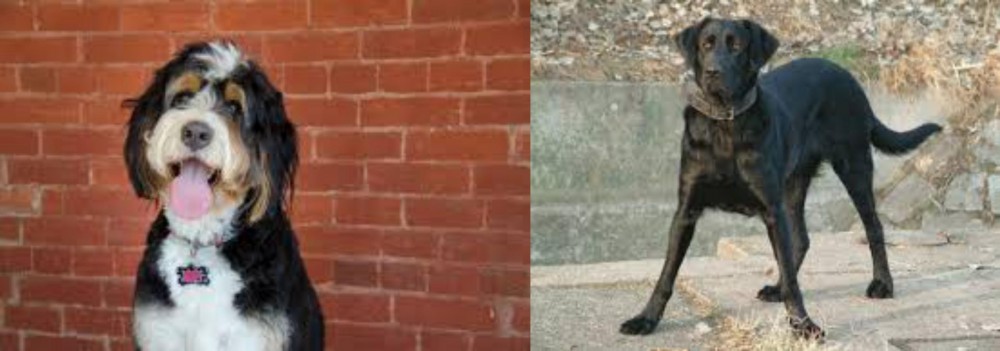 Bernedoodle is originated from Canada but Cao de Castro Laboreiro is originated from Portugal. Bernedoodle may grow 17 cm / 6 inches shorter than Cao de Castro Laboreiro. Bernedoodle may weigh 29 kg / 63 pounds lesser than Cao de Castro Laboreiro. Bernedoodle may live 3 years more than Cao de Castro Laboreiro. Both Bernedoodle and Cao de Castro Laboreiro has same litter size. Bernedoodle requires Moderate Maintenance. But Cao de Castro Laboreiro requires Low Maintenance
Bernedoodle is originated from Canada but Cao de Castro Laboreiro is originated from Portugal. Bernedoodle may grow 17 cm / 6 inches shorter than Cao de Castro Laboreiro. Bernedoodle may weigh 29 kg / 63 pounds lesser than Cao de Castro Laboreiro. Bernedoodle may live 3 years more than Cao de Castro Laboreiro. Both Bernedoodle and Cao de Castro Laboreiro has same litter size. Bernedoodle requires Moderate Maintenance. But Cao de Castro Laboreiro requires Low Maintenance
 The Bernedoodle is a hybrid cross between the Bernese Mountain Dog and the Standard Poodle. They have been around for many, many years but the first official” cross between the two breeds came from Sherry Rupke out of SwissRidge Kennels. The first Bernedoodle were achieved in 2003. She now has an entire breeding program for this hybrid.
The Bernedoodle is a hybrid cross between the Bernese Mountain Dog and the Standard Poodle. They have been around for many, many years but the first official” cross between the two breeds came from Sherry Rupke out of SwissRidge Kennels. The first Bernedoodle were achieved in 2003. She now has an entire breeding program for this hybrid.
A bernedoodle or a first generation is a cross between a purebred a purebred Poodle and a purebred Bernese Mountain Dog. This is a 50/50 mix. This mix is a very low shedding dog and though no dog is hypoallergenic, the Bernedoodle is as close as it gets. If the cross is true between two purebred dogs, the new breed will have the calm, sweet demeanor of the Bernese Mountain Dog and the intelligent, goofy, playfulness of the Poodle. At the same time the Bernedoodle is a hybrid so there will not be two exactly alike.
With purebred dogs you get a lot of consistency from one dog to another. Not so with the Bernedoodle. Each one will be a little different. Sometimes a hybrid dog can be healthier than their parents. Other times there can be health issues with hybrid. It is all about the breeder and if they breed for the right health traits.
If the breeder is conscientious enough the pup will have the best characteristics of both original breeds. Therefore, the Bernedoodle is happy, smart, playful, friendly and social. Sometimes the breeding doesn’t go as planned and you can end up with a Bernedoodle with the stubbornness of the Bernese or the hyper activity of the poodle. As a new cross breed, the Bernedoodle is not recognized by the American Kennel Club because it is a hybrid. They are recognized by the International Designer Canine Registry, The American Canine Hybrid Club, The Designer Dogs Kennel Club.
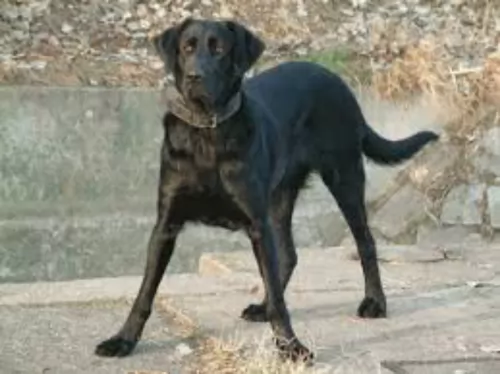 Cão de Castro Laboreiro originates from Portugal. Also known as the Portuguese Cattle Dog he was used long ago to guard livestock. Today, the modern Cao de Castro Laboreiro is descended from the molosser type dog.
Cão de Castro Laboreiro originates from Portugal. Also known as the Portuguese Cattle Dog he was used long ago to guard livestock. Today, the modern Cao de Castro Laboreiro is descended from the molosser type dog.
There are hints to the dog's origins from the 19th century, but changes in agricultural methods meant a disappearance of the dog as a livestock protector. Today the dog is mostly kept as a pet and was first seen at a dog show in 1914.
The Cão de Castro Laboreiro is recognized by the Fédération Cynologique Internationale as well as being recognized by the United Kennel Club in the United States.It is a rare dog and not many exist today but in Portugal, the USA and United Kingdom you will find a few breeders.
 Since the Bernedoodle is a hybrid and not an AKC recognized breed, there is no set-in stone breed standard. There are three sizes of Bernedoodles and at least three generations. All of these should be strong boned dogs with powerful and compact bodies. They have log ears, button eyes and a triangle shaped muzzle. The tail is long and bushy, and the coat is medium to long.
Since the Bernedoodle is a hybrid and not an AKC recognized breed, there is no set-in stone breed standard. There are three sizes of Bernedoodles and at least three generations. All of these should be strong boned dogs with powerful and compact bodies. They have log ears, button eyes and a triangle shaped muzzle. The tail is long and bushy, and the coat is medium to long.
There is no standard color, but the most common color is black and white or tri like the Bernese Mountain Dog. They can also be black and brown, sable or merle. The coat is wavy or curly like the poodle.
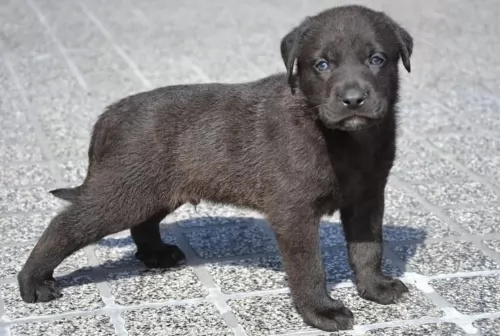 The Cão de Castro Laboreiro is a large dog, with height being in the region of 55 to 60cm and weight being in the region of 45 - 70kg. People describe the dog as wolf-like with a coat that is fairly short, thick and course. The coat is brindle with a base color of shades of grey, chestnut and black.
The Cão de Castro Laboreiro is a large dog, with height being in the region of 55 to 60cm and weight being in the region of 45 - 70kg. People describe the dog as wolf-like with a coat that is fairly short, thick and course. The coat is brindle with a base color of shades of grey, chestnut and black.
This large mastiff-type dog always has a black nose, his tail is long and carried high, but never curling over the back. He has a broad head and is much like the Labrador in looks, being free of wrinkles on the face.The ears of the Cao de Castro Laboreiro are medium-in-size and floppy while the eyes are dark brown.
The Cao de Castro Laboreiro makes an excellent pet as he forms strong bonds with his human family. He is territorial and makes an exceptional guard dog. He doesn’t particularly like strangers and is aloof around them.
This is an intelligent dog breed, he is strong-willed and stubborn, but when he is around the children in the family he is gentle and loving. When he has been trained and socialized, which is always highly recommended with every dog, he gets along with other pets in the home too.
 This is a very social dog that needs to be with people. If you don’t have a lot of time for a dog, then this is not the one for you. He is gentle, calm and affectionate. He is intelligent and sometimes stubborn. They need to be socialized early in life and they will be great with kids and other small animals. They tend to be very playful. Toys and minis have more energy, more stubbornness and more of the poodle divaness.
This is a very social dog that needs to be with people. If you don’t have a lot of time for a dog, then this is not the one for you. He is gentle, calm and affectionate. He is intelligent and sometimes stubborn. They need to be socialized early in life and they will be great with kids and other small animals. They tend to be very playful. Toys and minis have more energy, more stubbornness and more of the poodle divaness.
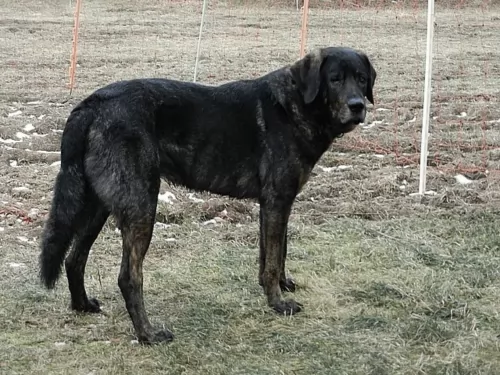 Environment and upbringing have plenty to do with how a dog turns out. People who just buy a dog for guardian purposes and nothing else can’t expect companionship in return.
Environment and upbringing have plenty to do with how a dog turns out. People who just buy a dog for guardian purposes and nothing else can’t expect companionship in return.
The Cão de Castro Laboreiro has always been a fearless guardian of livestock with his strong protective characteristics. He is intelligent and recognizes that a child in the family needs his protection.
This is a large dog who is strong, brave and intelligent but with his human family he is gentle, loving and loyal. Nonetheless he still requires a firm owner, and if you’re fair and firm with him you get the best with him. With this dog you can form a close friendship and bond.
 Because the breed is so new and bred pure so far, there is not a lot of information about their health or their life span. Even as they seem to have less issues than their parents – the Bernese cancer issue for example does not seem to plague the Bernedoodle. However, that does not mean they don’t have issues. They are still prone to some serious issues.
Because the breed is so new and bred pure so far, there is not a lot of information about their health or their life span. Even as they seem to have less issues than their parents – the Bernese cancer issue for example does not seem to plague the Bernedoodle. However, that does not mean they don’t have issues. They are still prone to some serious issues.
Skin issues, hip and elbow dysplasia, and eye issues are prevalent in this new breed. They have a tendency toward hot spots and sometimes allergies. Asks a reputable breeder if they have tested the parents and the puppies for dysplasia and eye issues.
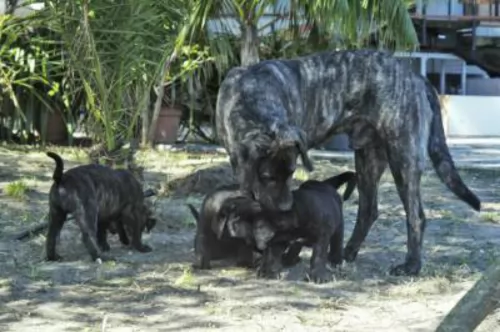 The Cão de Castro Laboreiro is generally a healthy breed, but even so, it is good to be aware of typical canine diseases that your pet may develop.
The Cão de Castro Laboreiro is generally a healthy breed, but even so, it is good to be aware of typical canine diseases that your pet may develop.
There are many eye problems that dogs have to contend with and if you see any kind of ulceration in your dogs eye, get veterinary advice.
A dog should always have access to a shady spot. Never ever leave your dog in a hot car. Heat builds up quickly and death can result soon as the body temperature rises.
Roundworm and tapeworm can infest dogs and you’ll need to speak to your vet about a worming program. Lice, mites and ticks are all parasites which attach themselves to the skin.
 Since the Bernedoodle comes in three different sizes, there will be three different feeding regimens. No matter the size of your dog, feed them quality food twice a day. The standard is a big dog and should be fed as such but the toy and mini will eat a lot less. You can pretty much feed a standard Bernedoodle the same thing you feed a Bernese Mountain Dog. The Bernedoodle is a picky eater and you may have to change up their food at times to keep them interested.
Since the Bernedoodle comes in three different sizes, there will be three different feeding regimens. No matter the size of your dog, feed them quality food twice a day. The standard is a big dog and should be fed as such but the toy and mini will eat a lot less. You can pretty much feed a standard Bernedoodle the same thing you feed a Bernese Mountain Dog. The Bernedoodle is a picky eater and you may have to change up their food at times to keep them interested.
Again, these are healthy dogs because the cross breed is so young. There are not a lot of genetic issues. As mentioned previously hip dysplasia, eye issues, elbow dysplasia and skin issues are possible.
This is a calm, not over active dog. They do not share the high energy level of the poodle but rather carry the calm, gentle energy of the Bernese. The toy and mini varieties tend to have a faster motor than the standard. They need daily walks no matter what their size is. They will need your attention regularly.
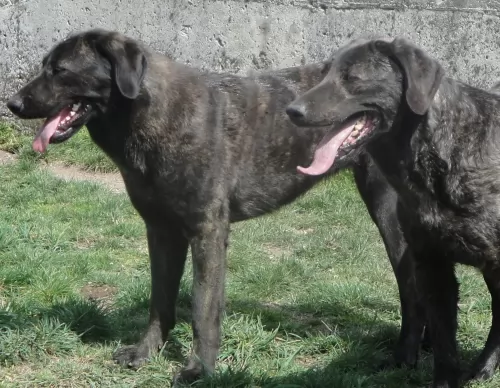 The Cao de Castro Laboreiro has a short coat which requires minimal grooming. Brushing him twice a week to rid him of loose hairs will suffice.
The Cao de Castro Laboreiro has a short coat which requires minimal grooming. Brushing him twice a week to rid him of loose hairs will suffice.
Nail clipping as well as ear- and teeth cleaning are other routine maintenance procedures for your pet.
The food you give your pet must be well-balanced and have protein and carbohydrates. If you want his skin and hair to remain healthy, vitamins, fatty acids and minerals will also be needed.
Boneless chicken and fish, brown rice and vegetables can be a good choice as well as some of the top quality commercially manufactured foods. An active dog will always need a higher protein content and therefore including raw meat into the diet is imperative – not every day as it can be very expensive, but every other day.
Remember that bones can be dangerous as they can splinter and cause your pet internal damage. Fresh, cool water must be available at all times.